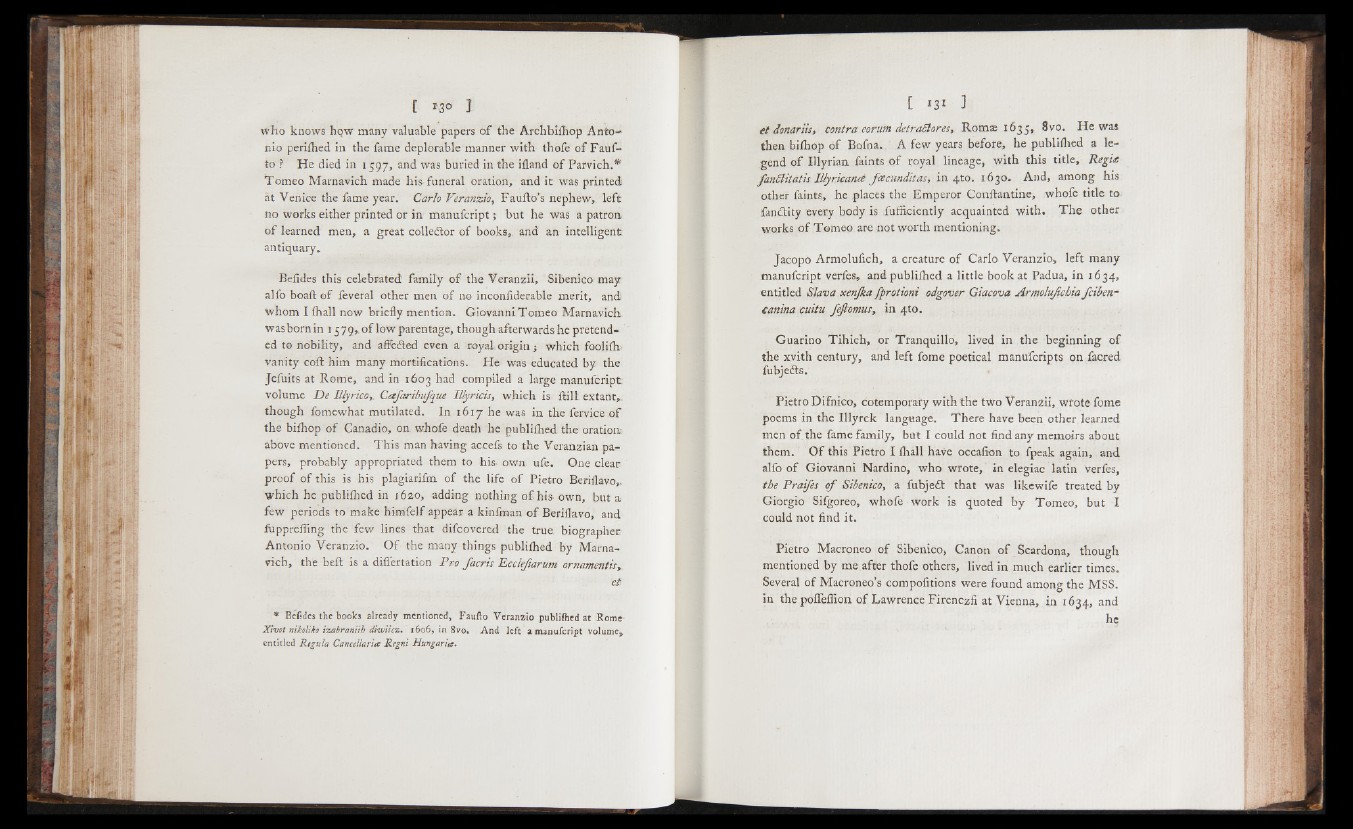
who knows hQW many valuable papers o f the Archbiihop Antonio
periihed in the fame deplorable manner with thofe o f Faufto
? He died in 1 597, and was buried in the ifland o f Parvich.*
Tomeo Marnavich made his-funeral oration, and it was printed*
at Venice the fame year. Carlo Veranzio, Faufto’s nephew, left
no works either printed or in manufcript; but he was a patron,
o f learned men, a great collector of books, and an intelligent
antiquary,
Belides this celebrated family o f the Veranzii, Sibenico may
alfo boafl o f feveral other men of no inconfiderable merit, and
whom I ihall now briefly mention. Giovanni Tomeo Marnavich
wasbornin 1 5 7 9 ,o f low parentage, though afterwards he pretended
to nobility, and affefted even a royal origin ; which fooliih.
vanity coil him many mortifications.. He was educated by the
Jefuits at Rome, and in 1603 had compiled a large manufcript
volume De Illyrico,, Ccefaribujque Illyricis, which is flill extant,,
though fomewhat mutilated. In 1617 he was in the fervice o f
the bifhop o f Canadio, on whole death he publifhed the oration-
above mentioned. This man having aecefs to the Veranzian papers,
probably appropriated them to his. own. ufb. One clear
proof o f this is his plagiarifm o f the life o f Pietro Beriflavo,,
which he publifhed in 1620, adding nothing o f his own, but a
few periods to make himfelf appear a kinfman o f Beriflavo, and
fuppreffing the few lines that difcovered the true, biographer
Antonio Veranzio. O f the many things publifhed by Marnavich,
the beft is a differtation Pro facris Ecclejarum arnamentis,
et
* Betides the books already mentioned, Faufto Veranzio publifhed at Rome-
Xivot nikoliko izabraniib diwiicz. 1606, in 8vo. And left a manufcript volume,
entitled Regula Cancellaria Regni Hungaria.
et donariis, contra eorum detrablores, Romte 1635, 8vo. He was
then bifhop of Bofna. A few years before, he publifhed a legend
o f Illyrian faints o f royal lineage, with this title, Regia
fanbiitatis lllyricanct fceclinditas, in 4_to. 1630. And, among his
other faints, he places the Emperor Conflantine, whofe title to
fanCtity every body is fufficiently acquainted with. T he other
works o f Tomeo, are not worth mentioning.
Jacopo Armolufich, a creature o f Carlo Veranzio, left many
manufcript verfes, and publifhed a little book at Padua, in 1634,
entitled Slava xenjka fprotioni odgover Giacova Armolujichia fciben-
canina cuitu fefiomus, in 4to.
Guarino Tihich, or Tfanquillo, lived in the beginning o f
the xvith century, and left fome poetical manufcripts on ..¿acred
fubjeCls.
Pietro Difnico, cotemporafy with the two Veranzii, wrote fome
poems in the Illyrck language. There have been other learned
men o f the fame family, but I could not find any memoirs about
them. O f this Pietro I fhall have occafton to fpeak again, and
alfo o f Giovanni Nardino, who wrote, in elegiac latin Verfes,
the Praifes o f Sibenico, a fubjeCt that was likewife treated by
Giorgio Sifgoreo, whofe work is quoted by Tomeo, but I
could not find It.
Pietro Macroneo o f Sibenico, Canon o f Scardona, though
mentioned by me after thofe others, lived in much earlier times.
Several o f Macroneo’s compofitions were found ampng the MSS.
in the pofieflion o f Lawrence Firenczfi at Vienna, in 1634, and
he